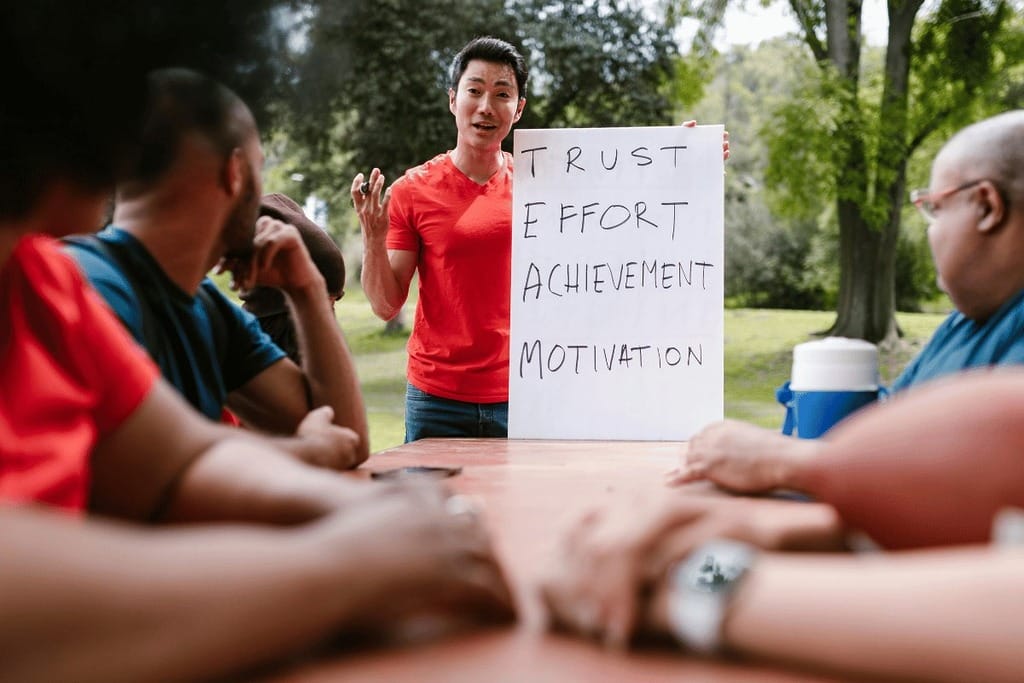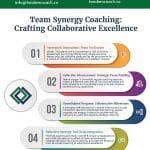Think back to the last time you faced a challenge that pushed you beyond your comfort zone as a leader. It wasn’t just your title that helped you through—it was your ability to adapt, learn, and grow that made the difference.
Leadership isn’t static; it’s a journey of constant evolution. If you’re aiming to amplify your impact, it’s crucial to invest in your own growth.
In this guide, we’ll cover practical strategies and dive into the essential development areas for leaders that can help you reach new heights—both for yourself and for your organization.
TL;DR – Key Development Areas for Leaders
Effective leadership involves growth in multiple areas. Below are the essential areas of improvement for leaders:
- Strategic Thinking: Balancing immediate tasks with long-term goals.
- Emotional Intelligence (EQ): Connecting with your team through empathy and emotional awareness.
- Communication Skills: Articulating vision and encouraging open dialogue.
- Adaptability: Thriving in changing environments and embracing new opportunities.
- Delegation and Empowerment: Empowering your team by entrusting responsibilities.
- Decision-Making: Making informed choices that align with both short-term and long-term objectives.
- Conflict Resolution: Managing disagreements constructively to maintain team harmony.
- Self-Development: Committing to continuous learning and personal growth.
We’ll explore these areas in more detail below. If you’re ready to develop your leadership skills, get in touch with us!

Why Leadership Development is Critical for an Organization
The success of any organization depends heavily on the strength of its leadership. Strong leaders inspire innovation, boost team morale, and drive strategic goals forward. Leadership development ensures that your leaders are equipped with the skills to face complex challenges, make sound decisions, and motivate their teams toward success.
Leadership is not a static skill; the best leaders recognize that they must continue to grow. By setting essential leadership development goals, organizations can create a culture of continuous improvement, which results in higher productivity, more innovative solutions, and improved employee retention.

Benefits of Development Opportunities for Leaders
Investing in leadership development opportunities brings about a wide range of benefits for the individual leader as well as the organization as a whole:
- Increased Efficiency: When leaders refine their skills, they get better at streamlining processes, managing teams effectively, and delegating tasks appropriately.
- Improved Employee Morale: Effective leaders know how to inspire their teams, creating a positive work environment that promotes collaboration and productivity.
- Enhanced Decision-Making: Leadership development helps leaders sharpen their decision-making skills, allowing them to make strategic choices that align with organizational goals.
- Talent Retention: Employees are more likely to stay with an organization when they feel valued and see opportunities for growth, both for themselves and within leadership.

8 Areas of Development for Leaders
Effective leadership is multidimensional, and there are several areas where leaders can focus their efforts to grow. Here are eight key leadership areas of growth to consider:
1. Strategic Thinking
Strategic thinking is all about balancing immediate tasks with long-term vision. It involves analyzing trends, anticipating future challenges, and creating a roadmap that aligns with organizational goals. By honing strategic thinking, you’ll be better prepared to navigate complex decisions and guide your team toward sustainable growth, ensuring that short-term actions contribute to long-term success. Leaders who excel in this area can better allocate resources, ensuring every decision drives the organization forward.
2. Emotional Intelligence (EQ)
Emotional intelligence helps you connect with your team on a deeper level. It’s also a highly sought-after skill, with 71% of employers valuing it above technical skills. Leaders with high EQ inspire better collaboration, resolve conflicts smoothly, and create a supportive work environment. Developing this skill allows you to lead with empathy and build stronger, more cohesive teams. Leaders who demonstrate emotional intelligence can also improve morale, resulting in higher team productivity and satisfaction.
3. Communication Skills
Being able to clearly articulate your vision, provide constructive feedback, and inspire your team are all critical components of success. Improving your communication skills, including active listening, will help reduce misunderstandings and increase team engagement, building a culture of open dialogue and trust. Clear communication also ensures alignment across departments, helping everyone to work toward the same objectives and improve leadership for remote and hybrid teams.
4. Adaptability
Whether facing new market trends, shifting team dynamics, or unexpected challenges, your ability to pivot and remain resilient will determine your effectiveness. If your leaders are adaptable, they will survive in changing environments and thrive by seizing new opportunities and driving innovation. This flexibility also trickles down to building a culture of resilience within the team, helping others confidently embrace change.

5. Delegation and Empowerment
By trusting your team with responsibilities, you empower them to grow and build accountability. Effective delegation frees up your time for higher-level strategic tasks and develops your team’s skills, creating a more capable and autonomous workforce that drives organizational success. When leaders delegate, they also create a sense of ownership among team members, boosting engagement and performance. Delegation is empowering, but only if tasks are delegated clearly, and follow-up steps are agreed upon from the beginning.
6. Decision-Making
As a leader, you must assess risks, weigh options, and make choices that align with both short-term needs and long-term objectives. Developing your ability to make informed, timely decisions will help you manage crises and capitalize on opportunities, ensuring steady progress. Effective decision-making minimizes uncertainty and builds confidence in your leadership among team members and stakeholders.
7. Conflict Resolution
Conflicts are inevitable in any team, but how you manage them can either strengthen or weaken the group. Building your conflict resolution skills allows you to address issues quickly, maintain harmony, and prevent small problems from escalating into larger disruptions, keeping your team focused on shared goals. A leader skilled in conflict resolution also creates a more collaborative environment, reducing the negative impact of disagreements.
8. Self-Development
Great leaders never stop learning. Whether through formal education, mentoring, or personal reflection, continuous self-improvement ensures you stay ahead in your leadership role. By seeking out new knowledge and experiences, you improve your capabilities and set an example of growth and adaptability for your team, encouraging them to pursue their own development. Leaders committed to self-development are more likely to inspire loyalty and respect from their teams, leading to long-term success.
If you would like to learn more about our leadership development program, book a free consultation now.

Examples of Development Areas for Leaders
To make these concepts more actionable, here are examples of how you can develop in two of the key areas:
Leadership Development in Strategic Thinking:
Engages you in exercises to enhance anticipation of change and future planning.
- Scenario Planning Workshops: Explore potential industry shifts, aiding in navigating complex market dynamics.
- Business Simulations: Challenge you to make strategic decisions with real-time feedback on long-term impacts.
- Cross-Functional Projects: Broaden your perspective by showing how different organizational parts interconnect and contribute to the overall strategy.
Emotional Intelligence Development:
Focuses on building self-awareness, empathy, and emotional regulation.
- Assessments and Feedback: Start with emotional intelligence assessments to identify areas for improvement.
- Empathy and Conflict Resolution Training: Enhances connections with team members and fosters healthier working relationships.
- Coaching and Mentoring: Provides personalized support to improve emotional resilience, helping handle stress and interpersonal challenges.
Strengthens not just individual leadership but also team dynamics and overall organizational performance.

Common Challenges With Leadership Development
While leadership development is essential, it’s not without its challenges. Many leaders struggle with the following:
- Time Constraints: Finding time to focus on personal development can be difficult with the pressures of daily operations. Leaders often prioritize immediate tasks over long-term growth, leading to stagnation.
- Fear of Change: Leaders can sometimes resist personal development because it requires them to step outside their comfort zone. Learning new skills and changing long-held behaviors can feel daunting.
- Lack of Support: Leaders may feel isolated in their development journey without proper organizational support. Leadership development requires not just individual effort but also organizational buy-in.
- Impatience for Results: Development is a long-term process, and leaders may become frustrated if they don’t see immediate results from their efforts.

Frequently Asked Questions (FAQs)
Here are some questions we frequently get about areas of growth for leaders:
What Are the Top Coaching and Mentoring Platforms for Leaders?
Two of the top platforms available that provide coaching and mentoring specifically designed for leadership development are:
- Tandem Coaching: Known for its personalized coaching programs, Tandem Coaching offers one-on-one sessions and development plans tailored to leaders’ specific needs.
- MentorcliQ: This software helps to engage, develop, and retain in-house employees by matching them with mentors within enterprises.
What Strategies Can Leaders Use to Enhance Their Strategic Thinking?
Leaders can enhance their strategic thinking by:
- Attending industry conferences that focus on future trends and innovation.
- Engaging in scenario planning exercises to explore different outcomes and prepare for future challenges.
- Setting aside time regularly to review long-term goals and evaluate progress against these goals.
What Tools Are Available for Enhancing Leadership Productivity?
To enhance leadership productivity, several tools are available. 360-degree feedback gathers performance insights from multiple sources, offering a well-rounded view of your strengths and areas for growth as a leader. Leadership style assessments focus on your approach to leading teams. For skill development, online learning platforms and coaching programs provide targeted learning opportunities. In terms of efficiency, project management software streamlines workflows, and time management apps assist you with task prioritization. You can also use strategic tools like SWOT analysis to improve decision-making and foresight.
Conclusion – Leadership Development Areas
Leadership development is not a one-size-fits-all process. By focusing on key areas like strategic thinking, emotional intelligence, communication, adaptability, and delegation, you can significantly improve your effectiveness and impact.
These areas are essential for driving both your personal and organizational success, and when approached with determination and dedication, they can unlock new opportunities for growth.
While there are challenges (e.g. to find the time), the benefits you get from committing to leadership development far outweigh the difficulties. Invest in these areas to improve your own skills and contribute to the overall success of your organization.
So take the leap – contact us now to book your tailor-made leadership development program with us.


















